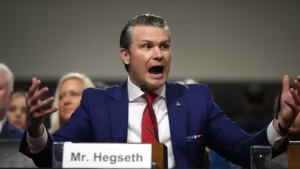In a moment that has quickly gone viral, Congressman Blake Moore (R-Utah) was caught on camera dozing off during an intense, overnight House Ways and Means Committee session. The footage, captured just before a critical vote on President Trump’s expansive legislative agenda, shows Moore slouched in his chair, eyes closed, until a colleague nudged him awake. This incident has ignited a nationwide debate on the demands placed on lawmakers and their accountability to the public.
The marathon session, which lasted over 17 hours, was part of the committee’s efforts to deliberate on significant tax reforms. Moore’s momentary lapse wasn’t isolated; Reps. Debbie Dingell (D-Mich.) and Jan Schakowsky (D-Ill.) were also seen nodding off during the Energy and Commerce Committee’s review of a contentious $900 billion Medicaid spending cut proposal. Dingell defended herself against online criticism, stating she had been awake for 31 continuous hours. The public’s reaction has been mixed, with some expressing empathy for the lawmakers’ grueling schedules, while others demand greater accountability.
The Toll of Marathon Legislative Sessions on Lawmakers
The recent incidents of lawmakers dozing off during critical sessions have brought to light the physical and mental toll of marathon legislative meetings. Extended hours, high-stakes decisions, and the pressure to deliver results can lead to exhaustion, affecting lawmakers’ performance and decision-making abilities. While dedication to duty is commendable, the well-being of those making pivotal national decisions is equally crucial.
Historically, Congress has seen instances where prolonged sessions have led to fatigue-induced mishaps. These events underscore the need for structured schedules that balance productivity with rest. Implementing measures to ensure lawmakers are well-rested can enhance the quality of legislative deliberations and decisions. As the nation watches, it’s imperative for Congress to address these concerns proactively.
Public Reaction: Balancing Empathy and Accountability
The viral footage of lawmakers sleeping during sessions has elicited a spectrum of reactions from the public. While some citizens empathize with the demanding nature of legislative duties, others view these incidents as a lapse in professionalism and responsibility. Social media platforms have been abuzz with debates, memes, and calls for reforms to address the issue.
Critics argue that such behavior undermines public trust and questions the efficacy of elected officials. On the other hand, supporters highlight the human aspect, emphasizing the challenges of maintaining focus during extended sessions. This dichotomy reflects the broader conversation about work-life balance, even in high-stakes professions like politics. As discussions continue, the importance of transparency and accountability remains at the forefront.
Historical Context: Lawmakers and Legislative Fatigue
Instances of lawmakers succumbing to fatigue during sessions aren’t unprecedented. Over the years, there have been multiple reports of legislators dozing off during prolonged debates or hearings. These occurrences highlight the enduring challenge of managing exhaustive schedules in the political arena.
Such historical patterns suggest a systemic issue rather than isolated incidents. They prompt a reevaluation of current practices and the potential need for reforms to ensure the health and effectiveness of lawmakers. By learning from past events, Congress can implement strategies to mitigate fatigue-related lapses, ensuring that representatives remain alert and responsive during critical deliberations.
Conclusion: Addressing the Challenges of Legislative Duties
The recent events of lawmakers falling asleep during sessions serve as a wake-up call for Congress and the nation. They underscore the immense pressures faced by elected officials and the potential consequences of unchecked fatigue. To maintain public trust and ensure effective governance, it’s essential to address these challenges head-on.
Implementing structured schedules, promoting wellness initiatives, and fostering a culture that values rest alongside responsibility can pave the way for a more efficient legislative process. As the nation continues to monitor these developments, proactive measures will be key in upholding the integrity and functionality of its governing bodies.
For more in-depth coverage and updates on U.S. political developments, visit USnewsSphere.com. Subscribe to trusted news sites like USnewsSphere.com for continuous updates.
[USnewsSphere.com / BBC]





